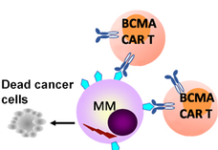Despite no statistically significant benefit in overall survival (OS) observed in the entire population of the Energy-GFPC 06-2015 study performed by the Groupe Français de PneumoCancerologie, there was a clinical signal of efficacy of combination treatment with nivolumab and ipilimumab over platinum doublet therapy in elderly patients with advanced non-small cell lung cancer (NSCLC) and performance status (PS) 0-1 with a significant OS benefit. The findings are presented by Dr. Hervé Léna of the Centre Hospitalier Universitaire de Rennes in Rennes, France at ASCO 2022 Annual Meeting.
The authors explained in the study background that a combination of PD1 and CTLA4 monoclonal antibodies have shown superiority over chemotherapy in patients with advanced NSCLC, but data for fit elderly or patients with PS 2 are scarce. The eNErgy compared the combination of nivolumab and ipilimumab to a platinum doublet in elderly or patients with PS 2 and advanced NSCLC. Primary endpoint was OS. Secondary endpoints included progression-free survival (PFS), objective response rate, and safety.
Main inclusion criteria were stage IV histologically confirmed NSCLC, age at least 70 years, and PS 0/1/2 or age less than 70 years and PS 2, EGFR–, ALK/ROS1–negative tumours, who were fit enough to receive a platinum doublet. The main exclusion criteria were active cerebral metastasis or contraindication to combination treatment with nivolumab and ipilimumab.
Patients were randomly selected 1 to 1 and stratified by age ≥ 70 versus < 70 years, PS 0/1 versus PS 2, and histology squamous versus no-squamous. Nivolumab 240 mg every 2 weeks and ipilimumab 1 mg/kg every 6 weeks were administrated until progression or unacceptable toxicity. Chemotherapy was planned for 4 cycles with carboplatin (AUC5) and pemetrexed (500 mg/m2 every 3 weeks) or paclitaxel (90 mg/m2 on days 1, 8, 15). In total, 242 patients had to be randomised to detect a treatment effect in hazard ratio (HR) on OS of 0.65 with a 85% power at a 2-sided alpha level of 5%.
A preplanned interim analysis performed after observation of 33% of deaths in 174 randomised patients, showed a risk of futility especially for patients with PS 2 with HR 1.8 (95% confidence interval [CI] 0.99-3.3). This led to a halt in randomisation, but continued follow-up of the 204 patients randomised at the time of the decision.
The final analysis was performed 18 months after the inclusion of the last patient. Most patients were men (71%). Median age was 74 years (range, 51-89). PS 0/1/2 was reported in 30%, 37.5%, and 36.6% of patients respectively. Smokers or former smokers were reported in 25.5% and 64.4% of cases. In total, 62% of patients had adenocarcinoma.
Median OS in patients who received the combination of nivolumab and ipilimumab was 14.7 months (95% CI 8.0-19.7) and 9.9 months (95% CI 7.7-12.3) in chemotherapy arm (HR 0.85, 95% CI 0.62-1.16).
The subgroup analyses showed a significant benefit for combination of nivolumab and ipilimumab compared to chemotherapy in elderly patients with PS 0/1 with median OS of 22.6 months (95% CI 18.1-36) versus 11.8 months (95% CI 8.9-20.5) and p = 0.02. However, in patients with PS 2, median OS in the combination arm with nivolumab and ipilimumab was 2.9 months (1.4-4.8) versus 6.1 months (3.5-10.4) in chemotherapy arm (p = 0.22).
Median PFS was significantly in favour for the combination arm of nivolumab and ipilimumab in the entire population, 5.5 months (2.8-8.7) versus 4.6 months (3.5-5.6) and p = 0.015.
Safety was similar with 31.4% of patients with grade ≥ 3 related serious adverse events in the combination arm of nivolumab and ipilimumab versus 49.5% in chemotherapy arm. Treatment was discontinued due to toxicity in 28.6% of patients in the combination arm of nivolumab and ipilimumab versus 22.3% in chemotherapy arm.
The authors concluded that despite no statistically significant benefit in OS observed in the entire study population, there was a clinical signal of efficacy for combination of nivolumab and ipilimumab over platinum doublet in fit elderly patients with advanced NSCLC.
Reference
Lena H, Monnet I, Bylicki O, et al. Randomized phase III study of nivolumab and ipilimumab versus carboplatin-based doublet in first-line treatment of PS 2 or elderly (≥ 70 years) patients with advanced non–small cell lung cancer (Energy-GFPC 06-2015 study). J Clin Oncol 2022; 40 (suppl 16; abstr 9011). DOI: 10.1200/JCO.2022.40.16_suppl.9011





